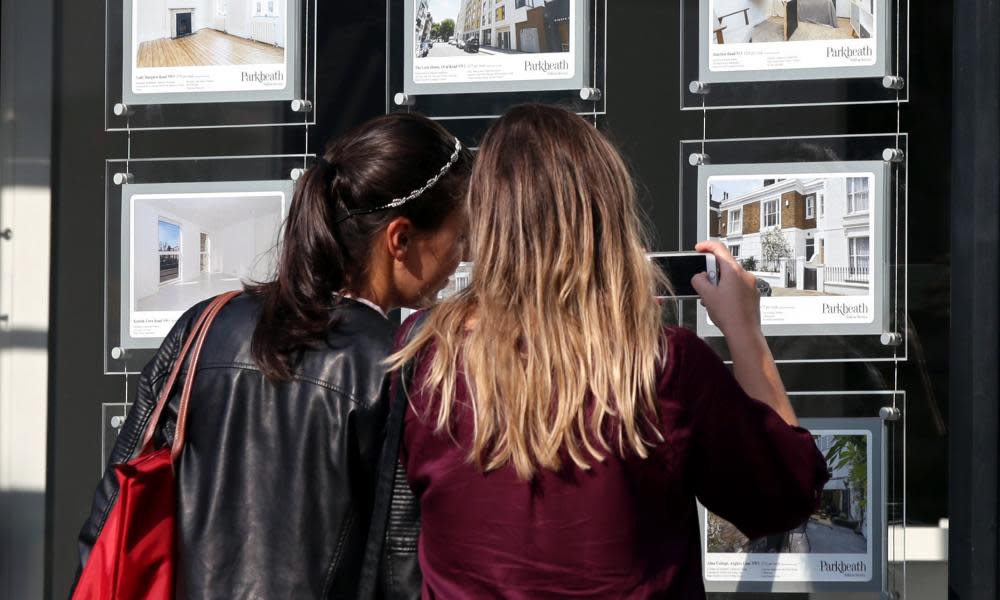Record numbers of young adults in UK living with parents

Record numbers of young adults in their 20s and 30s are living with their parents, according to official figures, with critics blaming soaring house prices and rents.
The Office for National Statistics (ONS) said that over the last two decades, there has been a 46% increase in the number of young people aged 20-34 living with their parents. Over the same period, average house prices have tripled from about £97,000 to £288,000.
In total, 1.1 million more young men and women are now living at home, with the number increasing from 2.4 million in 1999 to 3.5 million in 2019.
Men are far more likely to be staying with their mum and dad into their 30s. The ONS said 32% of all males aged 20-34 are now living with their parents, compared with 26% in 1999, with most of the increase occurring since the financial crisis in 2007-08.
One in five women (21%) aged 20-34 live with their parents, although this is also a substantial increase from the 14% level of two decades ago.
Georgie Laming of campaign group Generation Rent said: “Young people are facing an impossible choice: either stay, if you’re lucky, living in your childhood bedroom in the hope you can save a deposit – or rent and face a struggle to put money aside. Two thirds of private renters have no savings whatsoever.”
In its review of trends in British households in 2019, the ONS noted that the other major change is the number of people living alone. Single person households have increased by a fifth over the last 20 years, largely driven by men aged 45-64.
A total of 8.2 million people now live alone, up from 6.8 million in 1999. The ONS said higher proportions of men than women never marry and that after partnership dissolution, men are more likely to live alone while women may live with any children from the relationship.
One of the key reasons why young adults stay at home for longer is to save for the much higher downpayments needed on their first home purchase.
In the mid 1990s, young adults typically put down a deposit of just 10%, and house prices in real terms were much lower. Now, the typical first-time buyer struggles to find the £25,000 deposit typically needed, with the average figure – heavily skewed by London prices – at nearly £45,000.
Liz Emerson, cofounder of the Intergenerational Foundation, said: “These figures provide yet further evidence that intergenerational unfairness is worsening. We should all be ashamed that our young people cannot strike out on their own like previous generations have been able to do.”
Related: Tories fail to build any of 200,000 starter homes promised in 2015, says watchdog
Quite why so many more men than women stay at home in their 20s and 30s is not entirely clear.
When the ONS issued a report earlier this year on the “Journey into adulthood”, it said: “There are a few possible reasons for this: women have traditionally moved in with a partner at younger ages than men; women are also more likely to go to university; and there is some evidence that, early in their careers at least, women have been known to earn more than men.”
For many parents, the “boomerang generation” of offspring returning from university presents its own challenges. Research by Loughborough University and the Joseph Rowntree Foundation in January found that the average young adult in their 20s living at home saves £91 a week in rent, £16.50 in council tax and £12.80 in fuel bills.
But parents have to spend extra on food and heating, with the researchers suggesting that young adults should pay £100 a month for bed and board while at home.
The millions of young adults forced to stay at home or pay high rents could emerge as a key electoral battleground, with campaign groups demanding rent controls and targeting key marginal constituencies where renters could sway the result.
Generation Rent, working with other rental action groups, has identified 47 constituencies where the local MP’s majority is under 5,000 but where private tenants make up a higher than average proportion of voters.
Top of the demands in the campaigners’ national rental manifesto are new rent controls which would ban landlords from charging more than 30% of the local median income.
The tenants’ manifesto also demands an end to discrimination against tenants on housing benefit and the abolition of so-called “revenge” section 21 evictions (a section 21 notice is the form a landlord must give to a renter to start the process to end an assured shorthold tenancy).

 Yahoo News
Yahoo News 
